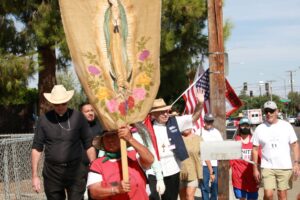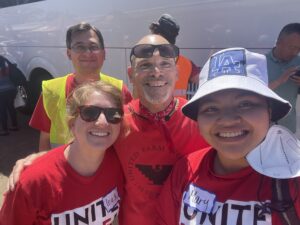Holy Working Men & Women Whom We Can Call in Prayer
A Labor Day Homily by Fr. Sinclair Oubre, Catholic Labor Network Spiritual Moderator
In the Spring of 1995, Road Warriors from the United Paperworkers Union came to the Sabine Area Central Labor Committee meeting at the Oil Workers Union Hall in Port Arthur, Texas. They shared with us how the A.E. Staley Company had locked out 760 of their fellow workers in June of 1993. They showed a video of a 1994 sit-down protest that was held at the Staley gates, and the pepper spraying of union members and their supporters by Decatur police. Much to my surprise, sitting down at the company’s front gate, and getting pepper sprayed was a priest. Later, I learned he was Fr. Martin Mangan, pastor of St. James Catholic Church in Decatur.
During the Summer of 1995, I was working on my license in canon law at The Catholic University of America. The summer program required us to attend classes in June and July. When classes ended, I reached out to Fr. Martin, and asked if I could drop by Decatur on my ride back to Texas. In my heart, I hoped he could teach me how to be a “labor priest.”
After riding from Washington, D.C. to Decatur, Illinois, I arrived at St. James Catholic Church. Fr. Martin greeted me, and invited me to go to dinner with him. I knew that this would be the time to ask him the question, “How do you do ‘labor priest?’” Before, I got the question out of my mouth, Fr. Martin looked me in the eyes, and asked, “How do you do ‘labor priest?’” It was immediately apparent that he was making it up on the fly just like I was in Southeast Texas.
Living out our lives as Catholics and as workers, we can find ourselves asking a very similar question to the one that Fr. Martin asked me: “How do you do Catholic worker?”
For many Catholic parents, the Holy Family is the model and source of hope. Mary and Joseph know what it is like to raise a child. Mary knows what it is to watch with horror as forces plot against her son. She knows the crushing sorrow of losing a child. So, parents turn to St. Joseph and St. Mary, and ask for their intercession to assist in meeting the difficulty of family life. Mary and Joseph know the situations parents struggle with without having to explain it.
As Catholic working men and women on this 2022 Labor Day, I suggest to you that there are many Servants of God, Venerables, Blesseds, and Saints who know your work, know your struggle, know your pain, and also know your craft and, by your labor, know your cooperation in God’s ongoing creation.
So, if you are a farmer, call on Blessed Franz Jagerstatter, a 20th century Austrian farmer, martyred by the Nazis. He knew well that trials early mornings and late evenings, as well as the bountifulness of God’s harvest.
So, if you are a domestic in a home or a housekeeper in a hotel or hospital, call on Servant of God Julia Greeley, who was born into slavery at Hannibal, Missouri, and worked as a domestic in Missouri, Colorado, Wyoming and New Mexico. She knew well the difficult work, but also the reward to assisting families she loved.
So, if you are a teacher, call on St. Elizabeth Ann Seton. A convert to the Catholic faith, and the founder of our nation’s Catholic school system. She knew well the challenges of educating immigrant children with insufficient resources, but also the wonders of opening the temporal and the spiritual world to young minds.
So, if you are a merchant mariner, call on Servant of God Captain Leonard La Rue, who rescued 14,000 North Korean refugees in 1950, and spent the next 47 years as a Benedictine monk. He knew well the might and terror of the sea, but also how God carries mariners and their ships in the palm of His hand.
So, if you are a beautician or a hairdresser, call upon Venerable Pierre Toussaint. A Haitian-American and former slave, who became renowned in New York for his skills, and for his great philanthropic generosity. He knew well the suffering and despair which his clients carried in their hearts, but also how to bring out the hidden beauty of every person.
So, if you are a music teacher, call upon Blessed Maria Belanger. A Canadian, she studied at the New York Conservatory from 1916 to 1918, and later became a sister of the Congregation of Jesus-Marie. She knew well the challenges of passing on great music to children, but also the joy that came when children discovered the eternal beauty of these works.
So, if you are a farmworker, call on St. Isadore. If you are a baker can call on Saint Clement Mary Hofbauer. If you are a construction laborer call on Venerable Matt Talbots. If you are a miner call on Blessed Nikolaus Gross. The holy women and men who know our lives, our labor, our challenges, our despairs, and our joys go on and on.
On this Labor Day, I wish to leave you with this wonderful message, “We don’t have to figure out how to be a good Catholic worker.” The path has already been blazed for us. Holy women and men have radically followed our Lord Jesus as intentional disciples. They can teach us much about our craft, and they can teach us much about how to follow Jesus as Catholic faithful. And they stand ready to intercede for us every day, in all our needs.
All Holy Men and Women, pray for us!


